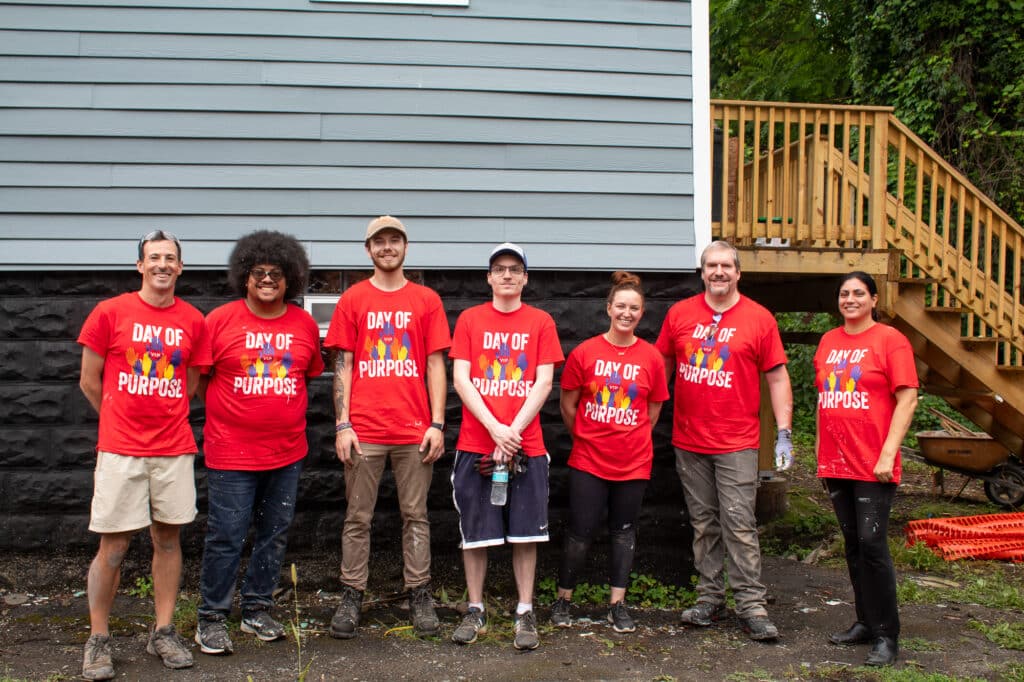Published: May. 03, 2022
By Stan Linhorst | Stanlinhorst@nullgmail.com

Meg Tidd, CEO of VIP, leads a meeting in a conference room at VIP headquarters at One Webster’s Landing, Syracuse. Seated left to right are Jayson Perrine, Sarah Thompson, and Bob Garner. Courtesy VIP/Michael Barletta
Meg Tidd’s dream was performing as a big-name soprano at the Met in New York. She was auditioning for a master’s degree in music but had growing doubts about traveling nearly every day, going from opera house to opera house. A connection persuaded her to also apply for an MBA program. It changed Tidd’s path from opera to business, bringing her back to Syracuse and to VIP Structures.
In March 2021, Tidd became CEO of VIP, taking over from her father, David Nutting.
Bob Currier, Jack Vahey, and Ron Engan started VIP in 1975. Nutting, an architect just graduated from Cornell, was their first hire. Soon, Nutting bought the company. He grew it over the decades, making it an integrated design-and-build firm and developer. He expanded with four divisions – VIP Structures Inc. (construction), VIP Architectural Associates, IPD Engineering, and VIP Development Associates.
The company has built more than 30 million square feet of space, mostly in Central New York but also
around the nation. It has developed and owned more than 3 million square feet. Locally, VIP has been key in a number of high-profile Syracuse projects, including the Pike Block, the Salt City Market, and the ongoing redevelopment of The Post-Standard’s former building overlooking Clinton Square.
When Tidd talks about leaders she admires, she describes empathy, kindness, and direct and fair feedback. She says leaders should be curious, ask questions, and observe nuances.
Tell me about early leadership roles and influences and how you went from music to business.
I was captain of sports teams, involved in school government, and early on stepped into roles like camp counselor, but I was reluctant to step forward. I didn’t necessarily seek out these roles. Usually someone came to me and said, we would like you to do this.
In my MBA program, we had a mentorship program and there were five of us in our cohort who oversaw that program. So, I’ve stepped into those positions, but in many cases somewhat reluctantly. In high school, I wasn’t necessarily always the A student. A lot of people know what they want to do with their life. I was certainly not that person. Applying to colleges, the one thing that stood out was that my mentors around me were saying you’re great at music, and you should do this. And so I did, because I didn’t really know what else I was supposed to do.
After high school (Class of 2004), I started at Queens University up in Canada. I majored in classical vocal performance. After two years, I transferred to the Boston Conservatory. I finished out my undergraduate degree there in classical vocal performance and graduated in 2009.
My plan was to keep pushing it and make a life of this. I had the dream of singing at the Met. I had the dream of being one of the big-name sopranos. What I found is there was a big difference between me and a lot of the people I went to school with. Many of them were OK traveling 363 days a year and working at different opera houses. I started to realize, I didn’t necessarily want that, but I didn’t know what else I was gonna do.
When I came out of undergrad, I studied with the head of the voice department at the Eastman School of Music in Rochester. I was still planning on applying to the Eastman School of Music for my masters. During that time, I took any job I could find, so I served tables, I was a temp worker, and eventually I landed a job as receptionist at a not-for-profit.
Sarah Korba was my boss at the non-profit, where I had gone on to PR and communications, doing some relationship management. Sarah’s husband, Nicholas Korba, was a student at the Simon Business School at the University of Rochester. He said, Meg, I really think you should apply to the MBA program.
I said, sure, I’ll apply to the business school, too. I got accepted at the business school, and it is one of the best things that ever happened to me. I loved music, but I didn’t love it the way that I saw my peers loving it.
Business happened to be the thing I did love to do every day.
It shows a person should not allow themselves to be stuck – always be open to change.
Yes. One thing that I have learned is that music gave me an incredible foundation for the work that I do now, but it took me a while to realize that.
How did it prepare you to be CEO?
First and foremost, you have to put yourself out there. So you’re constantly preparing to be on a stage, you’re being in front of people and having to present yourself. You’re finding that eloquence, finding that comfort, putting yourself in high-pressure situations where you still have to remember the words, even if you’re singing in a totally different language and then you have to sing in three other languages in the next 20 minutes, you have to have the poise and the commitment and all of the foundational work that went up to that moment to be prepared for that.
So there’s the intentionality and the hard work and the decisions of that performance and everything it encompasses. It’s also being in front of all of those people, of knowing you did the work to be confident in what you’re about to deliver.
The music world is art. It’s beautiful and collaborative, but it’s also competitive. To some degree you have to learn to put blinders on to criticism. For lack of a better term, you have to dream big. When the rest of the world is sitting there saying no way no how, you have to slough it off and keep committed to moving forward. There’s a really wonderful book called “Two Beats Ahead” (by Panos A. Panay and R. Michael Hendrix). It’s what musical minds teach us about innovation.
Musicians, you’ll find, see the world slightly differently. Like any artist, we’re forced to see all of the nuance, and we’re forced to be observers. To produce the art, we spend time observing, and observing what others are doing, and seeing the intentionality of composers.
What advice, what list of tips, would you give for effective leadership?
First, I would say trust your instincts. There is always data and there is always information and we should always use that data and information. But don’t let it sort of talk yourself out of things you know to be true. So truly trust your own instincts.
The next one I would say is observe. Ask questions. Be curious. I find there’s such power in observing and watching the nuance. How are people interacting with one another? How are decisions made? Instead of always being the first person to step up with the idea, watch and observe, ask questions, and be curious.
Number three is a piece of that: Never stop learning. It’s not only learning about your industry, but it’s also going well beyond that and pulling inspiration from many different places.
Put people first, but hold yourself and them respectfully accountable. In the best companies, people are at the core and the best leaders understand that their companies are nothing if not for the incredible people that work for their company and that choose to work for their company. Our people can decide to go anywhere they choose, and yet they’ve made the choice to be with us. That is an incredible opportunity and gift that they give.
Embrace the quiet. When you’re in a leadership position, there’s a lot of things going on around you all of the time. When you can embrace the quiet, it allows you to slow down, see those things that are going on, and to hear those moments in between each note and to find those nuances.
Number six, I would say is let yourself fail. It’s going to happen. Learn from it and move on.
Number seven, take the vacation.
And then number eight, trust the process.
Number six implies that fear of failure can hold a leader and a company back. Is that right?
100 percent.
You can’t live fearing failure. If you don’t experience failures and analyze those failures, you’re not learning. And it’s just as important to analyze successes.
If you want your companies to succeed, if you want to recognize that vision, or impact the world, or take care of your family, or whatever your motivator is, when you live in fear, you can’t learn from mistakes. You
can’t continually improve. You can’t break barriers and move things forward.
I’m thinking of scientists and their methods because my husband and I just had this conversation with our 7-year-old son. Scientists make a hypothesis. Sometimes they’re right, and sometimes they’re wrong. It’s in the wrong that they actually find their next right answer, the groundbreaking research. If we constantly hide from that failure and shy away from it, we’re never going to break those barriers. We’re never going to see the success that can actually happen in business. So business leaders need to be OK with that failure so long as they’re learning from it and analyzing it and
using it for the greatness that can follow.
We’ve all failed, and it’s in the failure that we learn and move forward.
Earlier, you mentioned being a reluctant leader. In a podcast last year you observed that reluctant, or not, people are watching. Can you elaborate?
I guess what I’m trying to say is I never necessarily wanted to be the person that people would look to. Jane Goodall has this incredible quote. Basically the gist of it is what you do makes a difference on this world, so you have to decide what kind of impact or difference you’re going to make.
So just a quick aside, empathy is interesting. A lot of people talk about it, and it’s a major buzzword. When I talk about empathy, not only do I think of having empathy for somebody else, but I think one of the
cornerstones of empathy is understanding how your reaction and your presence impacts the people that are around you. I believe that a big piece of that comes down to the impact that I may have, or who is
watching.
Whether I like it or not, people are watching what I am doing. People are learning from what I am doing. People need to know not only that I have, for lack of a better term, my stuff together, but also know I’m human enough to fail and to make mistakes. And it’s in their watching that they learn and they can grow.
I don’t think I’m sounding eloquent about this right now, but the crux of it is that no matter what, people are watching what you do. A leader has to be OK with that. You have to show up for them and you have to be there for them and you have to support them. You have to have the empathy to understand what this group of people needs right now, the empathy to give them the energy and the excitement to move forward.
People will watch you to see if you’re doing that.
And you need to do it honestly. Some days are really, really hard. It’s OK to be honest about that because not every day is going to be a walk in the park for you or your people. I feel I fumbled a bit through that
answer, but I hope it helps.
What qualities do you see in leaders you admire?
I think the three biggest ones are empathy, kindness, and leaders who give direct and fair feedback.
And again, for me, empathy is not only understanding someone else’s point of view, but really understanding how the leader is impacting the space and impacting their room.
I think kindness can be an underrated character quality. It’s hugely important for leaders to have that kindness. But in that same vein, admirable leaders give direct and fair feedback. I have a formal mentor and
I had requested her to be my mentor after watching her in a few group settings. She has this incredible way when she’s in a room full of people of being kind and relatable and yet being direct with feedback in a way that people feel inspired by her presence.
They want to be there, but at the same time they can sit there and go, oof, yes, we could have done that differently. Let’s figure it out.
Sometimes it’s all too easy to shy away from the real conversations. Brené Brown says clarity is kindness. I believe that 110 percent. I think we owe it to our people to kindly give them direct feedback for the work that they are doing. That’s a huge, huge leadership trait.
What attributes do you see in poor leaders?
A lot of times they lack empathy and emotional intelligence. Empathy and emotional intelligence are buzz words, so a lot of people talk about them and yet they’re not as common as perhaps we would all like.
When you become CEO or a leader, sometimes people want to say yes all the time. People may be a little worried about challenging you because of the position you’re in. Sometimes leaders lose sight of that and they’ll make decisions without really understanding where people are coming from. They forget that they
may be surrounded by people who are gonna tell them what they want to hear.
The best leaders I’ve seen remember that, and they seek out feedback and they actively seek out different sources for that feedback and they create a safe environment that people can actually tell them about a real
business problem.
Then the last attribute I would say is that poor leaders put themselves first and put their people last.
What brought you back to VIP?
We were raised in a wonderful family, but we were never raised in such a way that we were expected to come back to the company, nor did we ever presume we would. And so it’s a funny story. I had just taken the GMAT (Graduate Management Admission Test) to go to grad school for business. So I did auditions for
music and took the GMAT. My dad and I were hanging out one night and he turned to me and said, I hope you fail your GMAT.
And I said: Excuse me! I don’t even think that’s possible. What do you mean?
He laughed and his response was: Well, maybe then you’ll consider coming to the company.
I said to my dad: Hold the phone. I hear you. What does that mean? What could this look like?
So that was actually sort of the hatching of my potentially coming back. I had never even thought about that. I wasn’t sure what I wanted to do when I grew up, but I knew I always liked solving business problems, even when I was 14 working here as a receptionist in the summer, or as an 18 year-old waitress, or at the non-profit. I always wanted to find the better, faster, more streamlined way of doing things.
And so when I got accepted to the Simon School, we hashed out my degree and my path and focused it around what I could apply to the company. I started here as an intern while going to the Simon School. I was commuting back and forth for classes while working. I went from intern to digital marketing to chief marketing officer and then to chief operating officer. And then now to the role that I’m in now.
The people of Syracuse welcomed my dad with open arms. That is truly at its core of who we are today and the way that I run the company and the opportunities that we look for from a community perspective.
VIP Structures is a national design-build firm headquartered in Syracuse, NY. VIP has over 45 years of professional experience in architecture, construction, and development, as well as in-house engineering and property management expertise for commercial, industrial, and institutional clients. For more information, visit www.vipstructures.com.



